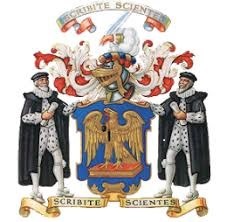Top Qs
Timeline
Chat
Perspective
Worshipful Company of Scriveners
Livery company of the City of London From Wikipedia, the free encyclopedia
Remove ads
The Worshipful Company of Scriveners is an ancient Livery Company of the City of London. Originally known as the Mysterie of the Writers of the Court Letter and, since its incorporation, as the Master Wardens and Assistants of the Company of Scrivenors of the Cittie of London [sic], the Scriveners' Company remains one of the few City livery companies continuing to influence professional standards, namely that of scrivener notary. The Company received its first ordinances in 1373 and its royal charter was granted by King James I on 28 January 1617.[1]
Remove ads
Historically, scrivener notaries were the only notaries public permitted to practise in London, the Liberties of Westminster, the Borough and other places within three miles of the City. In 1801, the British Parliament passed the Public Notaries Act confirming this status.
Scrivener notaries may be appointed after a two-year apprenticeship to a practising scrivener notary and passing the examinations as set by the Company. They must be fluent in one or two foreign languages and be familiar with the principles and practice of laws overseas. The ancient privilege of scrivener notaries was extinguished by the Access to Justice Act 1999, since when any notary public qualified in England and Wales may practise within the Company's former exclusive jurisdiction (i.e. Central London).[2] Nonetheless, they remain a discrete branch of the legal profession and their unique status is recognised in civil law countries by membership of the International Union of Notaries (UINL). The current professional qualification rules were adopted by the Scriveners' Court of Assistants in 1998.[3]
The profession of scribe has developed into public servants, authors, accountants, bookkeepers, typists and the Company further derives its membership from leading lawyers, courtiers and antiquarians.
Admission to the Freedom and Livery is, as with other City livery companies, via one of three routes: patrimony, servitude or redemption. Candidates must be proposed by two liverymen (one being a Court Assistant), or by authority of the Selection Committee. The Scriveners' Company first admitted lady members in 1665.
The Company's principal activities divide into four areas: professional, charitable, civic and social. Its charitable activities are governed by its Sexcentenary Charity Fund.
In the order of precedence of the City livery companies, the Scriveners' Company ranks forty-fourth. The Scriveners' Company has produced two Lord Mayors of London: Sir Robert Clayton in 1680 and Sir James Shaw in 1805.
The Master Scrivener for 2023/24 is Mr D John Hammond FCIL,[4][5] who heads the Company including its Wardens, Assistants, Liverymen, Freemen and Apprentices.[6]
The ancient Scriveners' Hall was burned down in the Great Fire of London (1666), being subsequently rebuilt and bought by the Coachmakers' Company in 1703. Destroyed in the Blitz, the site of its previous hall is in Noble Street, just off Gresham Street, near Guildhall, London.
Remove ads
Modern status of Scrivener Notaries
Six scrivener notary firms are active in the City of London: Cheeswrights, De Pinna, John Newton & Sons, John Venn & Sons, Saville & Co. and Larianae Notaries.[7]
The Worshipful Company of Scriveners is the only body from a common law jurisdiction professionally recognised by the International Union of Notaries.[8]
Arms
 |
|
Remove ads
See also
References
External links
Wikiwand - on
Seamless Wikipedia browsing. On steroids.
Remove ads

